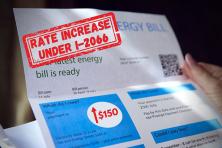Widespread protests put controversial pipeline under scrutiny in Canada
Direct action protests demanding “no pipelines on stolen land” are taking place across Canada, targeting a proposed fracked gas pipeline in British Columbia. Demonstrators have disrupted rail service in several provinces, focusing the nation’s attention on a dispute between gas company TC Energy and the hereditary chiefs of the Wet’suwet’en Nation. Canadian law enforcement has acted aggressively to remove blockades from rail lines. Prime Minister Justin Trudeau, who has called for accelerating climate action while also supporting fossil fuel development, is under pressure to help resolve the dispute. This video provides a useful timeline of recent developments.
Bezos invests, finally, in climate action
Amazon.com CEO Jeff Bezos recently pledged to donate $10 billion of his personal fortune to fighting climate change, prompting a range of responses including broad praise for Bezos, who has previously shown little interest in philanthropy. Some observers, including a large, vocal group of Amazon employees, note that the company itself has room for improvement regarding its own climate impacts; the company produces as much climate pollution annually as a small country. A statement from Amazon Employees for Climate Justice said, “We applaud Jeff Bezos’ philanthropy but….when is Amazon going to stop funding climate-denying think tanks like the Competitive Enterprise Institute and climate-delaying policy?”
Public broadcasting, brought to you by…
North Carolina-based electrical utility Duke Energy is a sponsor of public radio station WUNC. But the company’s on-air underwriting spots are drawing criticism from climate advocates who charge that the paid announcements, touting the company’s supposed commitment to reducing emissions, are both deceptive and impermissibly promotional. Climate justice group NC-WARN has filed a complaint asking the FCC to stop the ads and require WUNC to disclose details of Duke Energy’s sponsorship.
It’s worth noting that fossil fuel companies are often major sponsors of public television in ths US. Last month, British newspaper The Guardian announced that it would stop accepting ads from oil and gas companies.
Flip your fleet: vehicle fleet electrification drives growth
There are millions of fleet vehicles on the road every day—municipal, delivery, and private maintenance fleets; transit agencies and school buses; police cars and ambulances. Right now, fewer than 1% (2 million) of those vehicles are electric, but new projections show that number rising to almost 70 million by 2030. The next decade may prove to be a race between demand for electric fleets, as more companies join the EV100 initiative committing to all-electric fleets, and the market, which currently offers meager options for trucks, vans, and work vehicles.
One thing you can do
Lawmakers in Washington and Oregon are both considering important clean energy measures, as legislative sessions in both states begin to wind down. If you live in either state, this would be a good time to contact your elected officials and let them know you support climate progress!
Oregon legislators are considering a major climate action measure, Senate Bill 1530, which will hold large polluters accountable, cap climate pollution, and invest in a clean energy economy. Contact your legislator in support!
The Washington Senate is considering a Clean Fuel Standard. Make sure your senator votes yes to reduce pollution, improve public health and grow our state’s clean energy economy.





